|
|
|
Sort Order |
|
|
|
Items / Page
|
|
|
|
|
|
|
| Srl | Item |
| 1 |
ID:
062621
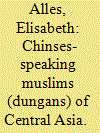

|
|
|
| 2 |
ID:
184172
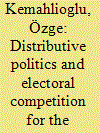

|
|
|
|
|
| Summary/Abstract |
Competition for the Kurdish vote has been important in contemporary Turkish politics. Focusing on the non-contributory health insurance program in the early period of AKP rule, this article shows that this competition also affected the distribution of benefits. Kurdish citizens’ likelihood of holding a Green Card increased with the competitiveness of the district between the AKP and Kurdish-oriented parties. The number of Green Cards and social spending were also higher when a Kurdish-oriented party posed an electoral challenge. These findings reveal the electoral calculation behind AKP’s strategy of favoring Kurdish voters as well as the importance of political organization for the minority group’s access to benefits.
|
|
|
|
|
|
|
|
|
|
|
|
|
|
|
|
| 3 |
ID:
097699
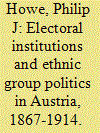

|
|
|
|
|
| Publication |
2010.
|
| Summary/Abstract |
This article tests ethnic exceptionalist and non-exceptionalist theories of political behavior by analyzing parliamentary elections in the Western half of the Austro-Hungarian Monarchy. Austria's gradual implementation of universal manhood suffrage before World War I provides an excellent opportunity to assess the effects of ethnic divisions in a democratizing country. Examining the interaction between political institutions and ethnic divisions affirms that voters' choices and the resulting party system were no more likely to reflect ethnic than other societal cleavages.
|
|
|
|
|
|
|
|
|
|
|
|
|
|
|
|
| 4 |
ID:
143675
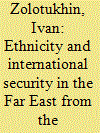

|
|
|
|
|
| Summary/Abstract |
Ethnicity in the modern world impacts national domestic politics besides forming puzzles for the international environment. Simplifying ethnicity may result in obvious blunders, particularly regarding political issues. For instance, examining the ethno-political factor leads to the assumption that rioting ethnicity threatens both domestic and international securities, with ethnic conflicts having a powerful destructive potential. Amidst the global trends, ethnic processes are converting into a trigger of the contemporary international relations. This article aims to study the role of ethnicity as significant non-governmental actors from the perspective of national security in the Far East. The objectives of the study include researching contemporary security issues in Northeast Asia as well as novel possibilities for Russia in the process of the formation of the structures of security in Northeast Asia. The main aspect of the paper is to describe the ethnosystems of the Far East (the cases of Koreans, Tungus and Nanai) as independent coherent phenomena. It is important to show that international security is the major psychomental complex of the national system and via what mechanism this drive for international security may force adaptation by the ethnosystem. It is important to provide a concrete example of an ethnic process adapting to international security as an external pressure imposed externally. Methodology: This paper is based on the results of previous researches and findings, including the data containing information about the ethnopolitical situation in Northeast Asia as well as the interrelations among the neighbouring states and referred to the system analysis and the interdisciplinary approach.
|
|
|
|
|
|
|
|
|
|
|
|
|
|
|
|
| 5 |
ID:
144461
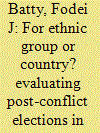

|
|
|
|
|
| Summary/Abstract |
The utility of post-conflict elections in sub-Saharan Africa has been the subject of lively academic and policy debates. While some scholars associate several electoral outcomes with votes for peace, others argue that post-conflict elections exacerbate existing cleavages and could reproduce the conditions that led to civil war if the right electoral system is not employed. This paper examines these contesting claims using electoral data in a comparative study of the first truly post-conflict elections in Sierra Leone and Liberia. The analysis shows that political leaders in both countries received votes across numerous cleavage lines in contradiction with an ethnic census.
|
|
|
|
|
|
|
|
|
|
|
|
|
|
|
|
| 6 |
ID:
117121
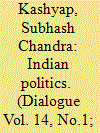

|
|
|
| 7 |
ID:
062083
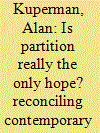

|
|
|
| 8 |
ID:
094432
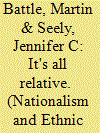

|
|
|
|
|
| Publication |
2010.
|
| Summary/Abstract |
Benin has held several rounds of free and fair presidential and parliamentary elections since 1991, but little is known about how the individual citizens of Benin cast their votes and why. We created a model to test what factors-social, economical, and political-impact individual support for certain candidates, using the Afrobarometer survey. We explored contextual factors, such as concentration of ethnic group in respondent's area, by marrying census data to the Afrobarometer's individual-level data. We found that different candidates appeal to voters for different reasons, and that ethnicity alone is usually not enough to explain support for a candidate. Moreover, we found that when ethnicity is a factor, having a concentration of the ethnic group in your region can enhance the effect of ethnicity on political preferences.
|
|
|
|
|
|
|
|
|
|
|
|
|
|
|
|
| 9 |
ID:
115349
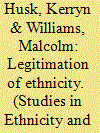

|
|
|
|
|
| Publication |
2012.
|
| Summary/Abstract |
In this article we examine the complex processes involved in small-scale ethnicity emergence and legitimation, and highlight the multi-dimensional elements present in moving from a strong regional identity to an externally legitimate ethnic group. We use Cornwall as a case study: administered as an English county, there has been a historic ethno-cultural movement for recognition alongside recent inclusion in national statistics; however, legitimation by external elites has been problematic. The first sections outline the Cornish as a group; we argue that however one conceptualises 'ethnicity', the people of Cornwall must constitute such a group. We examine the dichotomous effects of the interplay between strong regional assertion and a Cornish ethnicity more formally. In the latter sections we apply these arguments to broader sociological discussions around the legitimation of particular groups, and show that the Cornish are indicative of the wider theoretical literature. In conclusion, we assert that the Cornish are representative of the push/pull mechanisms felt acutely in any core/periphery power relations, and should be seen as central to emerging small-scale ethnic groups more generally.
|
|
|
|
|
|
|
|
|
|
|
|
|
|
|
|
| 10 |
ID:
160445


|
|
|
|
|
| Summary/Abstract |
In this article, we explore through analyses of interviews the meanings and experiences of everyday multiculturalism in a suburb in Melbourne, Australia. The people we interviewed valued and experienced diversity in different, yet interrelated ways: as an experience of multiculturalism, as providing comfort in diversity and as embodied in ethnic hubs in a segmented geography. Everyday racism can make forging belonging and connections across diverse ethnic groups difficult. Yet, Footscray is constructed as a place in which diversity is regarded as normative and protective. Our focus on a local suburb has allowed us to develop insight into the diverse ways identities are constituted through multiple understandings and experiences of diversity.
|
|
|
|
|
|
|
|
|
|
|
|
|
|
|
|
| 11 |
ID:
132734
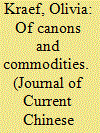

|
|
|
|
|
| Publication |
2014.
|
| Summary/Abstract |
The Nuosu are a subgroup of the so-called Yi ethnic group. Today around two million Nuosu live in Liangshan Autonomous Prefecture in Sichuan Province and translocal urban contexts, such as Chengdu and Beijing. For many centuries, the Nuosu have cultivated a belief system composed of a combination of animism and ancestor worship. Since the resurrection of religious activity across China that began in the early 1980s, this faith - represented by the three types of religious practitioners known as bimo, sunyi, and monyi - has reportedly been experiencing a comprehensive revival at folk level. For the bimo, this revival has been paralleled and increasingly overlaid by a scholarly reappraisal of Nuosu religion under premises other than religious. Bimo practice and identity have thus become subsumed under the illustrious concept of "bimo culture". In this article, I trace the genealogy of the concept of "bimo culture" as part of a cultural canon of and for the Yi which is intended to promote development at the local level but which is also contributing to a weakening of the status of the bimo and Nuosu ritual life in Liangshan today.
|
|
|
|
|
|
|
|
|
|
|
|
|
|
|
|
| 12 |
ID:
127816
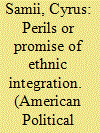

|
|
|
|
|
| Publication |
2013.
|
| Summary/Abstract |
A central question in the study of political development is how conflict between ethnic groups might be transcended. Findings from social psychology suggest that ethnically integrating institutions such as militaries or representative bodies may remove prejudices and exclusionary behavior that perpetuate interethnic animosity. Political scientists have tended to be skeptical, arguing that such processes may actually intensify or "freeze" conflicting ethnic identities. I use evidence from a hard case-military reform in the aftermath of a brutal, ethnically charged civil war in Burundi-to study this issue. At the macro level, the Burundian military undertook extensive quota-based integration that nonetheless resulted in a cohesive institution. A micro-level natural experiment, which produces quasirandom exposure to ethnic integration through the military retirement age, shows that exposure to ethnic integration decreases prejudicial behavior and is benign with respect to ethnic salience. Together, these results suggest promise in ethnic integration.
|
|
|
|
|
|
|
|
|
|
|
|
|
|
|
|
| 13 |
ID:
120753
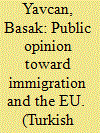

|
|
|
|
|
| Publication |
2013.
|
| Summary/Abstract |
Public preferences on immigration and attitudes toward the European Union (EU) have been shown to be closely related. In this article, it is argued that, to better understand this relationship, people's opposition to immigration should be differentiated based on the ethnicity of the prospective immigrant group. Specifically, in the case of Germany, Turkish immigrants constitute a special case. The results of the original survey experiment conducted in Germany suggest that, controlling for other explanations, categorizing immigration attitudes by ethnic group reveals that fear of EU enlargement and future Turkish immigration is actually a more important reason for Euroskepticism than has been shown so far. That is, people's opposition to immigrants from Turkey explains their overall Euroskepticism much better than their attitudes toward immigrants from within EU member states, suggesting that their attitudes are informed by opposition to further enlargement rather than a general dislike of multiculturalism.
|
|
|
|
|
|
|
|
|
|
|
|
|
|
|
|
| 14 |
ID:
130466
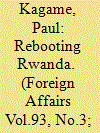

|
|
|
|
|
| Publication |
2014.
|
| Summary/Abstract |
On April 6, 1994, a plane carrying Rwandan President Juvénal Habyarimana was shot down by unidentified assailants. The next day, the killings began. Over the next three months, as the international community stood by, an estimated one million Rwandans-Tutsis and moderate Hutus-were systematically slaughtered by Hutu extremists, mostly using clubs and machetes. The genocide, one of history's worst and certainly its quickest, finally ended in July, when the Rwandan Patriotic Front seized control of the country. The rebel army was led by a 36-year-old Tutsi former refugee named Paul Kagame, who promptly took political control: serving first as the de facto leader of the country while defense minister and vice president and then, in 2000, assuming the presidency. During Kagame's two-decade rule, Rwanda has made spectacular progress. A country famously deemed "nonviable" in the mid-1990s has become one of Africa's best-run, most orderly, least corrupt, and safest states, with a booming economy (Rwanda's GDP has grown by an average of eight percent in recent years). But Rwanda's success has come with a darker side: opposition politicians have been jailed or killed under mysterious circumstances, journalists complain of harassment, and Kigali has been regularly criticized for meddling in neighboring Congo's long-running civil war. In late February, Kagame met with Foreign Affairs managing editor Jonathan Tepperman in Kigali to discuss these controversies, his tenure, Rwanda today, and the legacy of the mass killings two decades ago.
|
|
|
|
|
|
|
|
|
|
|
|
|
|
|
|
| 15 |
ID:
096841
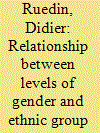

|
|
|
|
|
| Publication |
2010.
|
| Summary/Abstract |
This article examines the relationship between levels of gender representation and levels of ethnic group representation in national parliaments. Taagepera (1994) and Lijphart (1999) predicted that because of shared mechanisms and covariates levels of representation in the two forms should be positively correlated. Whilst this paper can identify a number of shared covariates, there is no evidence of an association between levels of gender and ethnic group representation. The lack of negative association suggests that increasing levels of representation in one form does not necessarily come at the cost of the other. Instead it appears that the salience and politicisation of divisions - approximated by the make-up of society - may shape the relationship between levels of gender and ethnic group representation: representation scores tend to be higher in the forms of representation that are thought to be more salient.
|
|
|
|
|
|
|
|
|
|
|
|
|
|
|
|
| 16 |
ID:
077660
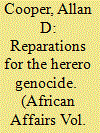

|
|
|
|
|
| Publication |
2007.
|
| Summary/Abstract |
The Herero were the first ethnic group to be subjected to genocide in the twentieth century. In 2001, the Herero became the first ethnic group to seek reparations for colonial policies that fit the definition of genocide. The Herero are the latest plaintiff to use the procedures of the Alien Torts Claim Act of 1789 to seek reparations in a US federal court for war crimes committed overseas. This article analyzes the legal arguments by Hereros against Germany within the context of current understandings of international law and identifies the challenges that lie ahead for this claim. The article also explores the implications of the Herero claim for other ethnic groups victimized by colonization.
|
|
|
|
|
|
|
|
|
|
|
|
|
|
|
|
| 17 |
ID:
166002
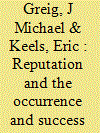

|
|
|
|
|
| Summary/Abstract |
In this article, we argue that because governments fear that accepting mediation and reaching agreements with opponents may signal weakness to other potential challengers, civil war governments tend to resist mediation as a means of demonstrating their resolve. Building on current theories of reputation in civil war, we argue that the threat of future challenges from other groups is likely to be particularly acute in states with multiple ethnic groups, especially states with high levels of ethnic exclusion. We therefore expect that civil wars in these states will be less likely to see mediation and to produce agreements when they do. By examining all instances of mediation in intrastate conflict from 1990 to 2008, we test this argument empirically and find that mediation is more likely to emerge in civil wars where there are a large number of ethnic groups, but is less likely to occur when many of those ethnic groups are excluded from the political process. Once mediation is underway, however, it is less likely to yield a negotiated settlement when there are a large number of ethnic groups, but more likely to end in a negotiated settlement when many of the ethnic groups are excluded from the political process.
|
|
|
|
|
|
|
|
|
|
|
|
|
|
|
|
| 18 |
ID:
132154
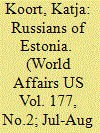

|
|
|
|
|
| Publication |
2014.
|
| Summary/Abstract |
I was born in Kohtla-Jarve, in northeastern Estonia, a city with a chemical plant, an oil shale plant, and several mines. My Russian parents, who had come to Estonia when they were children, had moved there in the 1960s from the capital, Tallinn, to help build the socialist future. My peculiarly named hometown was, and still is, located quite close to the Russian border, but at a time when the radio constantly played the popular song "Moi adres ne dom I ne ulitsa, moi adres Sovetski Soyuz" (My address is not a house or a street, my address is the Soviet Union), the meaning of the border between Estonia and Russia was something completely different for me than it is now. Most ordinary people at the time believed the Russian propaganda, reflected in everything from education to interior design, that all fifteen republics joined the Soviet Union voluntarily. To doubt this-or worse, share your doubts with someone-was a punishable crime. Later I also realized that for us, as Russians, it was easy to believe in the friendship of nations because our ethnic group was clearly in a privileged status in the vast Soviet family.
|
|
|
|
|
|
|
|
|
|
|
|
|
|
|
|
| 19 |
ID:
120168
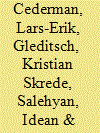

|
|
|
|
|
| Publication |
2013.
|
| Summary/Abstract |
A series of studies has shown that civil wars are caused not only by factors inside countries, but also by effects operating across state borders. Whereas a first wave of quantitative studies demonstrated that such effects make the "closed-polity" assumption untenable, more recently researchers have identified particular causal mechanisms driving conflict. Despite these recent advances, a central puzzle remains unresolved, namely why ethnic groups that at least in theory could count on support from large transborder ethnic kin (TEK) groups often have remained surprisingly peaceful, such as the stranded Russian populations in the "near abroad." We propose a theoretical framework that extends the analysis from the primary dyad between the incumbent and the challenger group by adding a secondary dyad that pits the incumbent against the TEK group. We postulate a curvilinear effect of the TEK group's relative size on conflict onset. Using a new data set on transnational ethnic links, we find that that the risk of conflict increases within the middle range of the size spectrum, consistent with our main hypothesis. This means that large TEK groups have a conflict-dampening effect, provided that they control their own state. Excluded TEK groups, however, are not associated with lower conflict probabilities.
|
|
|
|
|
|
|
|
|
|
|
|
|
|
|
|
| 20 |
ID:
181902
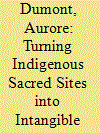

|
|
|
|
|
| Summary/Abstract |
Oboo cairns are sacred monuments worshipped by minority peoples in Inner Mongolia. The inclusion of oboo worship on China’s national list of Intangible Cultural Heritage in 2006 has caused negotiations and innovations in different social and ritual strata of local societies. Going from provincial decision-making to the local interpretation of heritage classification, this article examines how the indigenous intelligentsia and ordinary people appropriate oboo to make them valuable and powerful sacred monuments.
|
|
|
|
|
|
|
|
|
|
|
|
|
|
|
|
|
|
|
|
|